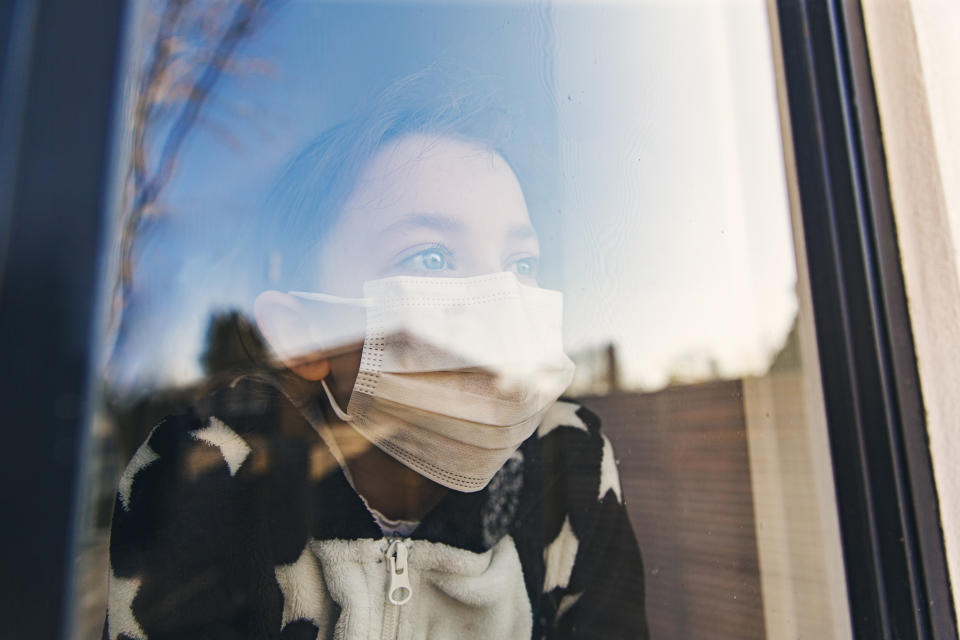School Counselors Predict How COVID-19 Will Change Our Kids

For nearly a year, the lives of children in the United States, and around the world, have been turned upside down by the COVID-19 pandemic. The majority still aren’t back in school full-time. About 30% of K-12 students remain fully remote, while another 26% are following a hybrid schedule, which means all of their typical routines — from the very structure of their days, to how and when they interact with friends and partake in extracurriculars — remains out of whack.
Estimates of the impact this is having on America’s children emotionally and academically run the gamut. Some are downright dire; others are more optimistic. But there is universal agreement that children will not emerge from the pandemic the same as they were before.
One group with unique insights into how children are faring, and what comes next, are school counselors, whose job it is to provide students with social and emotional support in-person or online. So HuffPost Parents spoke with several, who shared some of their thoughts about what they’re seeing right now — and what they expect kids will be like when the pandemic is finally behind us.
Some children will be stuck in ‘survival mode.’
For months, experts from various fields have sounded the alarm over the many ways in which the pandemic has compounded longstanding economic and educational inequalities for children in the U.S. For example: People of color have been disproportionately hit not just by the virus itself, but by financial hardship. And while reports suggest that all students have fallen behind traditional academic benchmarks, that is particularly true of students of color.
“A lot of families are stuck in survival mode. They’ve lost hours at work, lost jobs, lost money and food ... and this has a compounding effect. It has added stress, and when you have that added stress, kids feel it,” said Nina Essel, a school-based licensed clinical social worker in New Jersey and founder of Balanced Kids.
There are no easy solutions, Essel said. But she believes it is crucial for parents, teachers, counselors, schools and other institutions to keep this issue front and center in their minds — and plans — as we emerge from the pandemic. Every child will need support, but some will need it more than others.
Kids might need to re-learn how to really be ‘in the moment.’
Alicia Oglesby, director of school and college counseling at a Catholic high school in Maryland, said her students are certainly dealing with more anxiety after grappling with such uncertainty over the past year. And not just as a result of the pandemic, but because of the many overlapping emergencies of 2020.
Oglesby is concerned that they will carry some of that anxiety moving forward.
“Middle, high school definitely and even college-age kids are living through an enormous amount of sudden change and unpredictable change that leaves people just generally anxious,” Oglesby said. “They’re kind of waiting for the other shoe to drop — and I’m nervous that this will affect their ability to just be in the moment and enjoy life as it is and not feel like you have to worry about, you know the power grid going out.”
Fortunately, simply talking to children about what uncertainty is and what it feels like can help them learn to manage it. And now is a good time to help children develop coping skills to manage uncertainty in our current crisis and moving forward.
“As a school counselor, I’ve absolutely increased the amount of workshops that we’re offering,” Oglesby said. “We’ve approximately doubled the amount of that kind of work we’ve done this year ... because it does make me nervous.”
And they’ll have an even greater need to learn ‘soft’ skills.
Again, once all schools resume full-time in-person education, whenever that happens, educators will need to address learning loss. But school counselors argue that focusing on “soft skills” — like social-emotional development — will be even more important.
“This is a form of trauma. Not just for kids who have had losses because of death; there’s this loss of normal life, loss of going to school. Those are all different types of grief, but it’s all grief,” Essel said. “When schools reopen, we can’t go back as if nothing happened.”
There is evidence that some schools and school districts have already recognized the need to develop formal strategies to help children cope with their grief, whatever form it takes. New York City, which was the early U.S. epicenter of the pandemic, attempted to train thousands of public school educators in trauma practices to help support their students.
Counselors say they hope that this type of practical, social- and emotional-based learning becomes even more codified in our education system.
“We need to have classes that focus on emotions. Like, ‘What’s a coping skill? How do you recognize when you need help? How do you ask for help?’” Essel said. “It’s not something that we always prioritize, and there’s going to be an even greater need.”
But on the whole, experts really do think that children are resilient — and that they have developed even more skills that will help them bounce back.
“I think there’s a lot of hope in students,” said Oglesby.
Related...
Social Media Is Traumatizing Us More Than We Realize
I'm A Therapist Working With Children And Families. Here's How COVID-19 Is Affecting Them.
Why Kids Need Mental Health Days, Too — Especially Right Now
This article originally appeared on HuffPost and has been updated.

 Yahoo Movies
Yahoo Movies 
